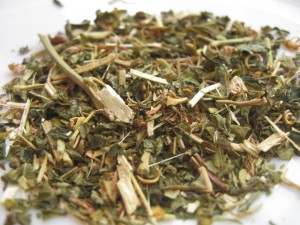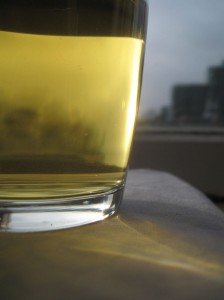Last updated: February 25, 2013
Passion flower tea is made from the dried leaves and stem of the plant Passiflora incarnata, which is also known as the maypop or purple passionflower. Passion flower tea may also be called passion flower herb tea, passionflower tea or passiflora tea. Passiflora incarnata has been used as a food and herbal medicine for hundreds of years in Europe and South America1 .
Appearance
Loose-leaf passion flower tea is made from the dried leaves and stalks of the passion flower plant. Although the name “passion flower” would suggest that the tea itself is made from flowers, passion flower is simply the name of the herb. The dried tea is dark greenish-brown or khaki with lighter yellow stalks. The dried tea has an earthy, rich aroma.
How to make passion flower tea
Unlike many other types of herbal tea, passion flower herb doesn’t become too bitter if it’s left to infuse for too long or at too high a temperature. This means it’s extremely easy to make.
- In a teapot or french press, add one heaped teaspoonful of passion flower herb for every cup of boiling water. Add the tea first and pour the boiling water directly over it.
- Cover the infusion and leave it to steep for at least 8 minutes. I usually infuse passion flower tea for a little under 15 minutes.
- Pour into cups to serve. Use a tea-strainer if your teapot doesn’t have a strainer basket.
- Add any other flavorings. For passion flower tea, I don’t use any!
Drinking passion flower tea
Color: the tea is a warm yellow-brown or ocher color. The color is a little similar to a very strongly brewed green tea.
Aroma: the tea smells pleasantly grassy with notes of hay. It smells a little sweet and meadow-like.
Taste: the baseline flavor is that same grassiness. It’s very pleasant. The notes of hay are more intense and verge on toasted oats or the toasted brown rice grains found in Japanese Genmaicha green tea. There’s a subtle quality to passion flower tea that’s almost spiced without having the individual notes of spices, similar to a really good garam masala. There’s a gentle saltiness that finishes with a mild sensation of dryness or astringency. Taken together, this tea is very savory without being heavy.
Sometimes I’ll leave passion flower tea to infuse for much greater lengths of time–upwards of 30 minutes very occasionally. With these extreme brew times, the tea becomes darker in color and more toasted in flavor. A note of bitterness creeps in that I still find palatable.
Passion flower benefits
Passion flower for anxiety
There have been three small clinical trials that looked specifically at Passiflora incarnata in the treatment of anxiety. Two focused on anxiety in patients awaiting surgery and one looked at generalized anxiety.
Both of the surgery trials found that passion flower appeared to reduce pre-surgery anxiety:
In outpatient surgery, administration of oral Passiflora incarnata as a premedication reduces anxiety without inducing sedation.
Oral preoperative administration of Passiflora incarnata Linneaus suppresses the increase in anxiety before spinal anesthesia without changing psychomotor function test results, sedation level, or hemodynamics.
The trial that examined passion flower in the treatment of generalized anxiety also found some evidence it may be effective.
The results suggest that Passiflora extract is an effective drug for the management of generalized anxiety disorder, and the low incidence of impairment of job performance with Passiflora extract compared to oxazepam is an advantage. A large-scale trial is justified.
However, all of these trials are exploratory and have very small sample sizes. A 2007 review found the following:
RCTs [randomized controlled trials] examining the effectiveness of passiflora for anxiety are too few in number to permit any conclusions to be drawn. RCTs with larger samples that compare the effectiveness of passiflora with placebo and other types of medication, including antidepressants, are needed.
In other words, there simply isn’t enough evidence to conclude that passion flower can help lower anxiety. It should also be noted that these trials looked at passion flower extract rather than passion flower tea.
Passion flower for better sleep
A small study in 2011 investigated the possibility of passion flower tea improving sleep quality. It found that drinking a cup of passion flower tea in the morning appeared to cause better sleep.
These initial findings suggest that the consumption of a low dose of Passiflora incarnata, in the form of tea, yields short-term subjective sleep benefits for healthy adults with mild fluctuations in sleep quality.
Once again, however, this is a single small trial so no firm conclusions can be drawn.
Passion flower side effects
I’m not aware of any passion flower tea side effects, nor could I find any mention of serious side effects in the literature. As always, I recommend asking your doctor before trying passion flower tea if you take any medication or have a health issue or are pregnant.
Final Thoughts
Passionflower tea is one of my favorite herbal teas to drink. It has a relatively strong, and extremely interesting flavor and is very easy to make. I like how unfussy it is–you can brew it for 8 minutes or for 30 and it’s a delicious drinking tea either way.
The evidence that passion flower tea can help with anxiety or sleep problems is promising but very preliminary. Hopefully, a larger study on the medical benefits of passion flower herb will be done in the future.
But this tea compares very happily on flavor alone. I’ve tried scores of herbal teas and this is one of my firm favorites.


